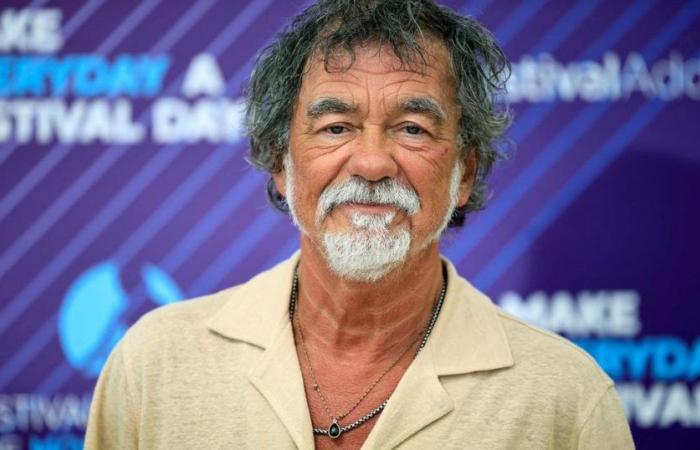INTERVIEW – Pax Massilia, Bronx, Stronghold 36… The master of French crime fiction continues his brilliant exploration of the police universe. For all of his work, he has just received an Honorary Nymph in Monte-Carlo.
Comments collected by our special correspondent in Monaco,
He has just finished filming Stronghold 36feature film in the vein of 36 Quai des Goldsmiths , but twenty years later, to be discovered in January 2025 on Netflix . And starts almost immediately with season 2 of the hit series Pax Massilia , for the same platform. Invited to the Monte-Carlo Television Festival to receive an Honorary Nymph for all of his work, the director, author and actor Olivier Marchal gave a few interviews. Where he talks about his job, his world, his desires, his projects.
TV MAGAZINE. – How are you Olivier Marchal?
Olivier Marchal. – Alright. I went to bed a little late because I spent yesterday evening with JoeyStarr, but it’s going very well.
“I will never shoot in Paris again. Only prohibitions, constraints, aggressiveness, even violence. It’s anxiety-inducing, absolutely unbearable. »
To talk about a project?
Not immediately. I would like. But here, I take a breath. I just finished filming Stronghold 36 which goes into editing. Thirteen weeks of filming in Paris with Victor Belmondo, whose grandfather I really liked, Yvan Attal who plays the boss of the department and a slew of young actors. And it was hell. I will never shoot in Paris again. Only prohibitions, constraints, aggressiveness, even violence. It’s anxiety-inducing, absolutely unbearable. Unlike, for example, Marseille, of which we often say the worst, but which, beyond the fascination I have for it, is a welcoming, bright, friendly, easy, caring city. We’re going back in December for season 2 of Pax Massilia. Five months of intense filming in an equally intense city.
Monaco is not really your style…
They give me a prize. The least you can do is come. I am touched. Such recognition. And we’re not going to complain about being here for a few days…
Pax Massilia is one of Netflix’s last big French successes. What effect does this have on you?
Frankly, I was the first to be surprised. I think it’s Marseille, it’s the atmosphere, it’s the casting, the lighting, what it conveys, perhaps my way of filming. I probably have an audience that follows me for that too. And it was indeed such a hit that we were “forced” to do a season 2. The public is waiting. I don’t want to disappoint them. We’ve been writing for a year. It goes quickly. Very quickly.
There is also Bronx And Overdose … Between you and the platforms, is something going on?
They offer me more freedom. And more money. In terms of overall budget, it’s incomparable. For example, the 13 million I needed to make Stronghold 36I wouldn’t have gotten them from linear television or cinema. Bronx was viewed by 90 million people. Pax Massilia has exceeded 100 million… It’s a world exhibition which for little French people like me is great. This is one of the truly wonderful developments in the audiovisual landscape. Apart from that, I work with TF1 or France Télévisions as well as with Amazon. However, I admit to being quite piqued and happy at the idea of rubbing shoulders a little with foreign competition. It inevitably creates a kind of emulation, a desire to show off, to upgrade oneself, with works whose sources I draw from American film noir from the 80s à la Michael Mann without denying any of my crazy admiration for those of Claude Sautet and Jean-Pierre Melville.
“I am godfather of the BRI. My friends were at the Bataclan. I can only be on their side. All is said. »
You were talking about the climate of violence earlier. And we also think of all the positions taken against the police. Do your productions work to rehabilitate a profession that is suffering?
I always defend them a little. I know their commitment and the work they do. Afterwards, my cops, they are always a bit “borderline”. I can only defend this profession. I love them. I respect them. What is happening in France… I am sponsor of the BRI. My friends were at the Bataclan. I can only be on their side. All is said.
You left the police in 1994. Thirty years later, do you continue to draw on your own experience or do you now turn more readily to the stories of your former colleagues?
I draw on my memories of being a cop but I also know that she has evolved. We try to integrate new ways of working. It will always inspire fiction and I am very happy to be part of that. For Bastion, I took all my actors to 36. They rubbed shoulders with the cops of the BRI, the BRB, they went on patrol with them, they remained speechless in front of the shield hit with 27 bullet holes from the Bataclan terrorists who hangs in the entrance to the unit… Deep down, I’m quite proud to make this environment known through cinema and series. I bring my actors there who bring the audience there. And we have great times. We shoot cops all the time. It tires me a little. Because they are also great guys who are willing to pay with their lives and experience terrible things. It’s good to be reminded of that sometimes.
Is there an Olivier Marchal style?
I try to honor the people who watch my films. For now, knock on wood because everything worked. I’m waiting for the day I go wallowing because I know it happens to everyone. I was very influenced by the cinema of Sergio Leone, Michael Mann, Michael Cimino. Without comparing what is not comparable, I try to show myself worthy of my masters, to make a somewhat American-style image, to shoot in anamorphic scope with very special cinema lenses, always with the spirit of the French thriller in the style of Robert Enrico and those I cited above. To summarize, I like to mix American-style filming and intrigues anchored in the tradition of French crime fiction. And I think that’s what pleases. At least until then.
“This is perhaps the only difficulty I find in collaborating with platforms, the deadlines that must be met, the urgency. But it’s also quite rock’n’roll. »
You shoot one after the other… How do you do it?
I work a lot. For season 1 of Pax Massilia, for example, I wrote at night. I slept 3 hours. Then I returned to writing. During the day, I worked on something else. In short, this caused me health problems. This is perhaps the only difficulty I find in collaborating with platforms, the deadlines that must be met, the urgency. But it’s also quite rock’n’roll. It pulses. It’s rhythmic. Ultimately, I even think that it even served the series by giving it a bit of a punch.
What do you think of the current fashion for police comedies? Are they likely to kill the gender you wear?
I am not opposed to it. But actually that doesn’t interest me. For me, the thriller must remain a film noir. For me, crime fiction is the somewhat dark side of the characters, it’s the desperate cases, the locations, the atmospheres, the harshness, the climaxes.
And as for this other fashion which consists of systematically adapting or commissioning scripts for TV films or series from famous writers as if to endorse audiovisual creations?
I’ve worked with quite a few writers. I often see them a little helpless when it comes to writing fiction because it’s fundamentally different. They play the game. But they are quickly lost. To the point that some give up, give up or back down. Particularly those who do not accept the constraints linked to writing a unit or a series. Writing a book is a solitary exercise. That of a series passes through dozens of hands, from the creator to the producers to the sponsors. Many feel dispossessed. Stronghold 36, for example, is not an original screenplay. I adapted it from a novel by Michel Tourschers, written fifteen years ago and called Cop Requiem. I totally modernized it. I changed everything. And I sent the script to the writer. He told me it’s good but I don’t relate to it…
“My only frustration is seeing people on the train watching films on their phones. I don’t know what they can perceive or remember about the light, the costumes, the sets. »
Several of your feature films have been released in theaters. Do you have any frustration that ones, like Bastion 36, are intended only for platforms?
Frankly, none. Frankly, the anxiety of Wednesday, with today, for black films and in the best case scenario, the prospect of making between 500 and 700,000 admissions, because the public no longer goes to the cinema only to see comedies… It makes me sick. When we release a film on a platform, we are relaxed. We have the budget and if the film is successful, we have the assurance of being seen by tens of millions of people. My only frustration is seeing people on the train watching movies on their phones. I don’t know what they can perceive or remember about the light, the costumes, the sets. I don’t know.
Do you sometimes want to go towards genres other than crime fiction?
I do what I know how to do and what people come to me for. Because it works. Because people like it. And because it’s complicated to let go of what you’re good at. But I have desires. A project about the First World War, a very beautiful love story that I have been carrying out for seven years, but big budget. And I’m adapting a play by Dan Fante, writer, playwright and son of John Fante, a text in the form of a family closed session that he wrote during his alcohol detoxification treatment. I’m writing a western. No comedy. I love the genre but it’s too complicated. I wouldn’t risk it.
And what about your acting hat?
I’m not really interested in acting anymore. I was disappointed with the texts of the last two seasons of Crimson Rivers. It always became the same thing. We passed the dishes. And I refused three plays. I am old. I am 65 years old. I don’t want to leave anymore. I prefer to be at home and write.
Not even a little duet with your daughter?
Oh yes. I have an appointment with Gaumont in a few days. A story between a father and his daughter… I would love to play with Zoé. She too, I think.






